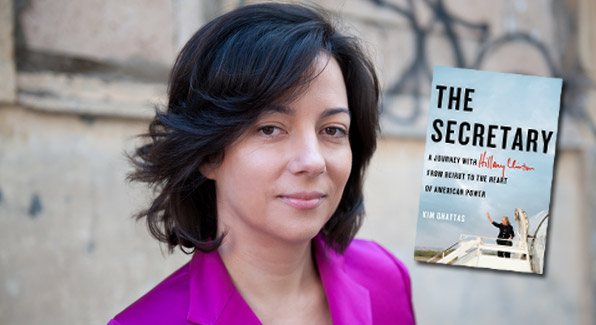BBC correspondent Kim Ghattas explores Hillary Clinton’s legacy.
By Sarah Valerio

Author Kim Ghattas of “The Secretary.” (Ghattas photo by Dina Debbas. Cover courtesy Times Books, an imprint of Henry Holt and Company.)
Though she is now retired from her role as Secretary of State, the world is still fixated on Hillary Rodham Clinton, as experts wonder what move she will make next. But to have an informed opinion of the person and the politician moving forward, much insight can be gained from a glance back.
In “The Secretary,” BBC State Department Correspondent Kim Ghattas provides a revealing glimpse at the woman who was the face of the United States to the rest of the world for the past four years. Ghattas paints a portrait of Clinton from a behind-the-scenes perspective, thanks to her unparalleled access as a member of Clinton’s press corps, traveling with her around the globe.
Ghattas, who grew up in Beirut in the midst of the Lebanese civil war, was a skeptic of American foreign policy, having lived her young life on the receiving end of it. In light of her background, it is noteworthy that she writes about Clinton with sympathy, respect and admiration, and about American foreign policy as nuanced and complex.
The author elaborates on the way Clinton, in agreeing to work with former rival President Barack Obama, sought to restore America’s image in the world — as well as her own. Ghattas writes that the United States brand was badly damaged under the Bush administration, but thanks in part to Clinton, “there is a lot less animosity towards the U.S. now then there was four or five years ago. Overall, countries around the world are willing to do business with the U.S. again and America is a sought-after partner again,” Ghattas tells Washington Life.
She notes, however, that the role the U.S. plays on the world stage is a double-edged sword. “The U.S. is still more popular now than it was under the Bush administration, but less than it was a year into Obama’s term. As a superpower, the U.S. will always be loved and resented. That’s just the fate of a superpower,” she says.
“The Secretary” explores landmark events including the Wikileaks fallout, the Arab Spring, the assassination of Osama Bin Laden, and the situations in Libya and Syria, that will likely define foreign policy under the Obama administration with Clinton at the helm.
Yet with all the ups and downs that have marked U.S. foreign policy and Clinton’s job as Secretary in the past few years, Ghattas in the book describes the former first lady as resilient and commanding; doggedly committed to the job. Like Obama, Clinton sought to shape U.S. foreign policy into a “smart power,” shifting from the heavy-handed tactics of President George W. Bush.
“Smart power is the combination of soft and hard power, and the combination of diplomacy, military and development. The Obama administration has worked to implement the concept of smart power but the jury is still out about whether this will work or not. But both Clinton and Obama felt this was the best way forward — to redefine the exercise of American leadership and try to to find new ways to remain relevant as a superpower in the 21st century,” Ghattas says.
The book also examines Clinton as a person, not just as “The Secretary,” culminating at the Golden Globe awards when actress and comedian Amy Poehler followed Bill Clinton’s appearance with the statement: “That was Hillary Clinton’s husband.”
“It showed that after four years as secretary of state, Hillary Clinton emerged fully from the shadow of her husband, with her own power, not derivative power,” Ghattas says. “She had always been her own person in her own right, but being Secretary of State was fully her own gig. She campaigned for America for four years around the world and in the process, resorted her own political fortunes.”
